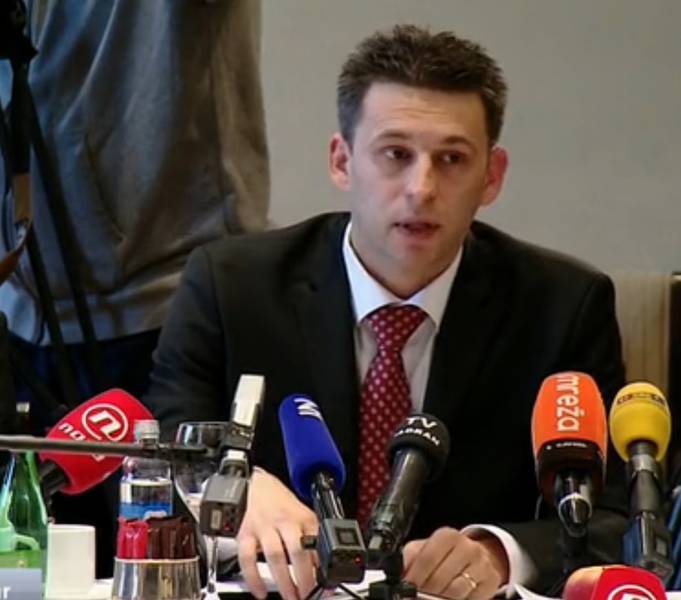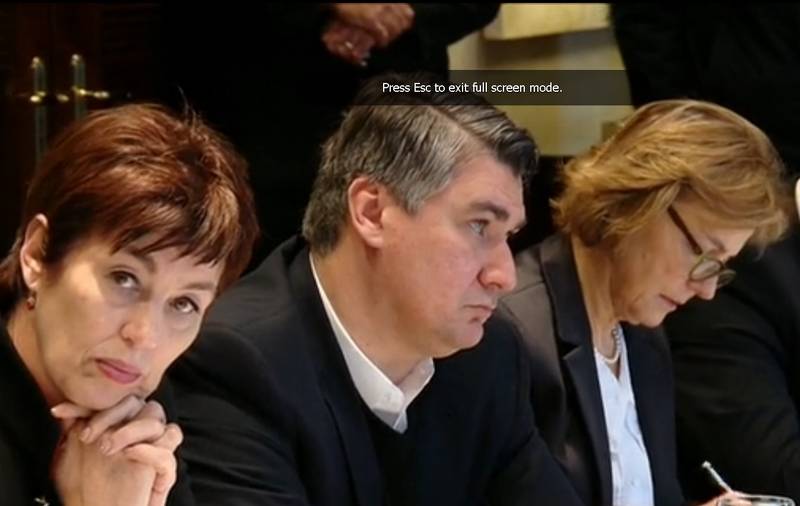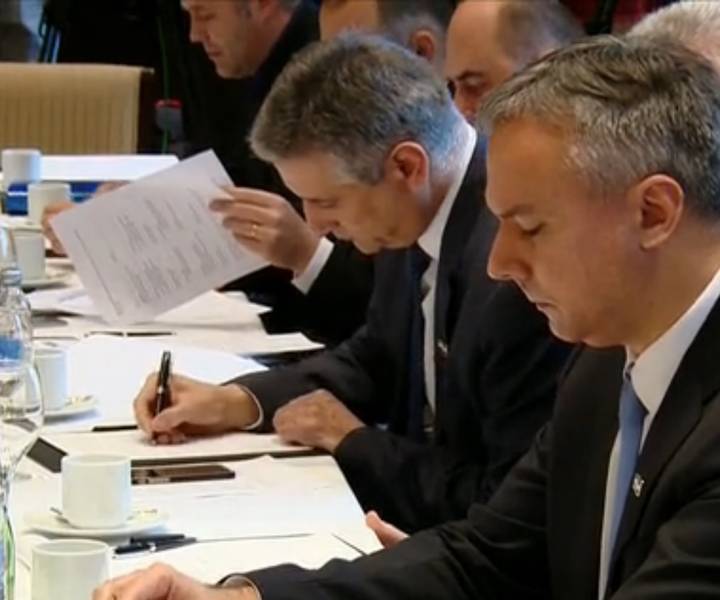Croatia's Political Bubble Most Burst
Adelina Marini, December 10, 2015
 A rare political event took place in Croatia on Monday – the three “winners” of the parliamentary elections of November 8th sat down at the same table – the two largest pre-election coalitions “Croatia is Growing” and the Patriotic coalition, as well as the political sensation Most, made up of independent lists, which ruined the plans of the two traditional election rivals – the left-wing and the right-wing. After a month of unsuccessful negotiations on the formation of a new government Most decided to make an attempt for evading the more and more probable new elections by suggesting all three political powers sit at the negotiations table and figure it out between themselves. The meeting was called for 12 noon in the luxury hotel “Esplanade” in the centre of Zagreb. Initially, Most had stated that whoever turns up first for this meeting will be the one they will discuss forming a government with. Eventually, things evolved to a three-way meeting and incumbent Prime Minister Zoran Milanović asked that it is public.
A rare political event took place in Croatia on Monday – the three “winners” of the parliamentary elections of November 8th sat down at the same table – the two largest pre-election coalitions “Croatia is Growing” and the Patriotic coalition, as well as the political sensation Most, made up of independent lists, which ruined the plans of the two traditional election rivals – the left-wing and the right-wing. After a month of unsuccessful negotiations on the formation of a new government Most decided to make an attempt for evading the more and more probable new elections by suggesting all three political powers sit at the negotiations table and figure it out between themselves. The meeting was called for 12 noon in the luxury hotel “Esplanade” in the centre of Zagreb. Initially, Most had stated that whoever turns up first for this meeting will be the one they will discuss forming a government with. Eventually, things evolved to a three-way meeting and incumbent Prime Minister Zoran Milanović asked that it is public.
At exactly twelve o’clock on December 7th all TV channels had live broadcasts of the talks and Twitter literally bubbled with reactions and commentaries. The meeting, opened by Most leader Božo Petrov, started rather uneasily, for he announced that he wanted to talk about creating a broad coalition with the participation of all three political powers. Before the meeting even started PM Milanović announced that he had come rather to listen, not talk, but he turned out to be the one that spoke the most. Many in Croatia caricature Božo Petrov as the messiah because of his specific preaching tone of speech and also because of him insisting on reconciling and bringing together the two largest political parties in the country, which have been rotating in government ever since the independence. After a half hour of generalities and restraint by the Patriotic coalition and “Croatia is Growing”, exactly when it looked like the meeting was a complete failure and meaningless, Božo Petrov finally presented his formula for a tripartite coalition.
He proposed a supra-partisan candidate be a Prime Minister and the two traditional coalitions rotating in the First Deputy Prime Minister seat, while Most reserves the second Deputy PM seat for themselves. He proposes a rotation for the post of Speaker of the Croatian parliament (Sabor), modelled after the European Parliament’s leadership – half the term for the patriots and the other half for the centre-left coalition. Most want one sixth of the ministerial seats for themselves and demand that another 1/6 is given to neutral people. Mr Petrov demanded that the two political powers considered the offer and came up with a reply by the end of the week. He said responsibility was now theirs. This outraged the leader of “Croatia is Growing”, Zoran Milanović, who said Most were in no position to give ultimatums. He claimed not to have a mandate for such a decision and needing to discuss this at a party conference of the Social Democratic Party (SDP). Same should be done by the other parties in the pre-election coalition. He criticised Božo Petrov for not presenting his idea at the very beginning.
The leader of the Croatian Democratic Union (HDZ) and the Patriotic coalition, Tomislav Karamarko, was reserved, but stated that the idea, although valuable, is not real. The patriots are unable to sit at the same table with a government, which has failed during the last four years. Once again he repeated the pre-election main points about the mass emigration of Croats, high unemployment and bad economic results. Nevertheless, he stated he was leaving an open door. Zoran Milanović gave as good as he got by saying that he could not be in the same government with a party, which has members with effective sentences for corruption. The two parties were at completely opposite opinions about the timing as well.
According to Zoran Milanović, the current situation is totally normal and democratic. In his words, there are countries, which had taken even longer time to form a government. Tomislav Karamarko said, however, that Croatia is in a crisis and needs to form a government with maximum speed, for the challenges are way too many to afford to leave the country with no leadership. He sent an indirect threat, recalling the Paris terrorist attacks, hinting that without a government the country is threatened by terrorism. Zoran  Milanović reminded that Croatia currently does have a government, an interim one, and called for remaining calm.
Milanović reminded that Croatia currently does have a government, an interim one, and called for remaining calm.
During the meeting Italy and Greece were given as examples of countries with expert governments. In 2011, under serious pressure from the euro area because of fear of the domino effect of the crisis, Italy and Greece got technocrat governments appointed, headed by economic experts. Alas, their success is rather dubious. They did not manage to finish their term because of strong opposition by the political powers in the two countries. Outrage rose in voters that their governments were parachuted in by the EU and had no democratic legitimacy. Despite the many similarities, Croatia is not yet in Greece’s situation, but even if it falls into a crisis, it is highly unlikely anyone will pressure it about the kind of government it should choose in order to implement necessary reforms, because its economic troubles pose no danger to anyone in the EU.
The meeting ended after about an hour of Božo Petrov attempting to convince the two political powers to accept his offer. It became clear by his statement in front of journalists that the political power, which accepted his offer, would be the one to form a government with, leaving the door open for the other one. Meaning whichever coalition is the first to say “no” will remain out of government. It was on just the following day that one of the partners in “Croatia is Growing” – the liberals of Foreign Affairs Minister Vesna Pusić – announced they were against a broad coalition, for it will leave the country without opposition. There will be practically just six people in opposition, said Ms Pusić. Other politicians, but also analysts, warned as well that a wide coalition is returning to the single-party model of government, which Croatia overthrew just 25 years ago.
During the meeting, Božo Petrov announced that there would be no government without opposition, but was unable to present a single solid argument supporting this claim. There is more talk of new elections in the centre-left coalition, whereas the right-wing coalition of Tomislav Karamarko prefers to avoid this scenario with the argument that it would be too expensive. To Most, the meeting of December 7th was a tremendous success, because two unrelenting rivals – Zoran Milanović and Tomislav Karamarko - were brought to the same room. The election campaign passed entirely under the sign of mutual attacks between the two of them. The overall feeling after the meeting was that during it the political bubble of Most burst. Božo Petrov often lapsed into inability to reply adequately to specific questions by both sides, repeating the same mantra about reconciliation, consensus, and responsibility.
The longer the meeting continued, the more obvious it became that Most are incapable of tough decisions. Moreover, it was clearly visible that they attempt to shirk their responsibility, transferring it to the two larger parties, whose long experience in Croatian politics came forward. The meeting was a huge success for the leader of the Social Democrats, Zoran Milanović, who claimed the credit for the publicity of the meeting and demonstrated statesmanlike behaviour, something admitted by his opponents as well. Tomislav Karamarko was reserved most of the time and rarely intervened. The behaviour of “Croatia is Growing” was impressive. All members of the coalition contributed to the discussion, without somebody directing it, thus exposing the harmony that the centre-left coalition is working in. The main spokesperson for the Patriotic coalition was its leader,  others intervening here and there. Božo Petrov was also the main spokesperson for his formation during the meeting.
others intervening here and there. Božo Petrov was also the main spokesperson for his formation during the meeting.
There were constitutional arguments among the participants as well, even going as far as appeals for the Constitutional Court to intervene. If no agreement is reached over the next few days the subject of what comes next, according to the Constitution, is about to replace all other issues. Who and when is supposed to sign for new elections, should a caretaker government be appointed, or the incumbent one should continue to do its duty, should the parliament be constituted or not? Questions, which the two largest parties in Croatia have the direct opposite answers to. There is another problem about to appear on the agenda – the 2016 budget is not voted in yet.
Translated by Stanimir Stoev
 Kolinda Grabar-Kitarovic | © KGK
Kolinda Grabar-Kitarovic | © KGK Jozo Rados | © European Parliament
Jozo Rados | © European Parliament Aleksandar Vucic, Andrej Plenkovic | © Vlada RH
Aleksandar Vucic, Andrej Plenkovic | © Vlada RH